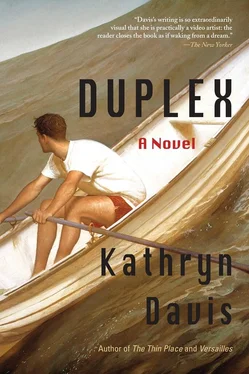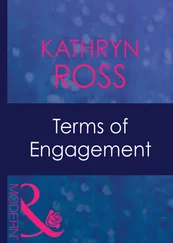The flag signified a town, she thought, probably Little Alton. The word on Little Alton was conflicting. Don’t stop there if you can help it. Little Alton’s bells were famous. If you stopped in Little Alton you could live forever but then you would also have to stay there forever. Little Alton was beautiful beyond compare. It was heaven on earth; the caravans had been there for such a long time their wheels had sunk into the dirt. They were strung with fairy lights and there were marble plaques planted in their dooryards engraved with the inhabitants’ surnames, one of which was bound to be your own.
After a while Marjorie got so close to the tower that she could see that the flag flying above it was red with a gold hand, meaning her assumption that this was Little Alton was correct. The gold hand’s fingers were outspread, which meant that the hotel had a vacancy. If she quickened her pace she could make it there before it got any darker.
For some time now she’d been hearing a sound that seemed to be coming from the other side of the wall, a soft padding sound like the paws of a large animal loping across the hard pack. When she stopped, the sound stopped, suggesting that maybe what she was hearing was an echo. The sound was amiable, its absence menacing. A moist wind picked up and she could hear seagulls, the tolling of the bell she’d heard earlier, louder now, like it was inside her ears. It rang four times, though the hour seemed much later. Possibly the number signified something other than time.
She passed a burning haystack on the left, a group of schoolgirls in blue uniforms.
“What happens if you touch it?” one of them was saying.
“You didn’t, did you? Did you?”
They gathered to examine the girl’s palm.
“See,” said another girl. “The part that looks like a burn. That’s how you can tell if it was alive or not.”
“Well, was it?”
“I don’t know. It was very cold.”
“Like freezer burn?”
“I said I don’t know.”
The wall continued straight ahead, separating Marjorie from the tower. The girls must have come through some kind of opening, a gate or a door. She was so tired she could barely stay upright. Even so she kept walking. There was no way through the wall, of that she felt positive, just as she knew Little Alton was right there on the opposite side, producing the noise and smells of human interaction, doors opening and closing, wheels moving, motor exhaust, garbage, a hotel. She hadn’t seen a scow for a long time, and she wondered whether that meant they didn’t come this far north.
A throbbing pain had started up in her left side and she couldn’t catch her breath — she had to lie down before she fell. Another large haystack, this one not aflame, seemed to have been erected in her path and she didn’t have the energy to walk around it. Instead she slid to the ground and came to rest with her back against the wall. Until she’d arrived here she’d thought she’d been headed north but now she thought she must be facing west, the shrub-strewn landscape unrolling to bunch at the horizon in a line of small irregularly shaped hills capped with tall thin trees, and behind them a spectacular sunset.
She put her cheek to the wall; it felt cool. From the other side came the sound of panting, a rattling chain. Even if she held her breath the sound didn’t go away. She made a pillow of her jacket and lay down. The breathing on the other side of the wall grew more regular, eventually turning to gentle snoring, with little growls and yips every now and then. Sometimes it moaned exactly like a man.
“It’s all right,” Marjorie said. “Shhh.”
Often when you thought back you found yourself in an actual moment like it was a place. The rain was falling, long strings of it breaking loose and hitting the classroom windows. The day was dark, the sky lowering — she’d had to put on the ceiling lights the moment she got to school. Mary was sitting at her desk at the front of the room, taking a test. She was answering questions about the names of Christopher Columbus’s ships. Cutouts of orange and yellow and red leaves were taped to the windowpanes; Eddie was copying off Mary’s paper. His desk was next to hers and even though he did this often Miss Vicks never moved him to another seat. He didn’t need Mary’s help, she knew that. He only wanted to share her brain.
He had been a nice-looking boy with delicate fingers like a concert pianist’s, except it was Mary who was the pianist, albeit a bad one. Eddie had started life uncoordinated and jumpy and then to everyone’s amazement he turned out to be an athlete. There had been an accident — she strove to remember. Every night all summer long the boys played baseball in the street. From time to time a car would appear. Not so many cars back then, but even so everyone had to be careful.
With her back against the wall, Miss Vicks drew her knees to her chest and tucked her hands under her armpits.
“You can go home now, Edward,” she said.
FOR MANY YEARS MARY COULD THINK OF NOTHING except her daughter and it was the same for Blue-Eyes — she couldn’t get enough of Mary. She followed her everywhere with a hand attached to some part of her mother’s body or clothes. Walter wanted to send the girl to a private school where they learned to speak foreign languages and handle money and say prayers, but the school was too far away for Blue-Eyes to attend as a day student, which would have meant leaving her bed empty night after night with no one for Mary to read to or sing to sleep. Of course this had been Walter’s plan all along.
Instead Blue-Eyes went to the same school Mary had gone to, the one just before the first of the three green hills leading to the Woodard Estate. When she got old enough Mary dropped her off at the head of the street and Blue-Eyes walked. She took the same route her mother had taken and, like her mother, she carried a new schoolbag. Several of the sycamores had died and been cut down; all of the bubblers in the schoolyard had been replaced by hygienic drinking fountains. Mary smelled the plastic of her daughter’s schoolbag and felt an ache in her heart, the same ache she felt when she first held the Yellow Bear. It was a smell associated with those moments when normal time was suspended and something out of the ordinary happened, like the first game of the spring when a ball landed at her feet and Eddie came running toward her and after he bent to scoop it up his face lifted — so close she could see all his eyelashes sticking out around his eyes like sunbeams in a drawing.
Blue-Eyes loved school, certainly more than Mary, who had preferred naptime and recess. Every Parents’ Night the teachers heaped nothing but praise on the girl, and her work was always prominently on display, bearing a gold star or an A+ or 100 %. There was something not quite right about Blue-Eyes, though; Mary could see how uncomfortable every thing she did made the other parents and the teachers. For example, the movie about the Descent of the Aquanauts that she painted on a roll of shelf paper that got wound on chopstick handles past an opening cut in the bottom of a shoe box — once you started turning the handles it was like you were churning the sea inside the box to such a frenzy it was only a matter of time before it got out and then it would be everywhere, making such a mess you’d never be able to clean it up. “It isn’t that your daughter can’t do the work,” the teachers said, peering earnestly into Mary’s face. “She can do everything, but…” They were never able to finish the sentence, a problem Mary had long since grown used to.
Teachers came and teachers went but the school itself remained remarkably unchanged. Strips of Palmer method script still hung above the chalkboards, and the same lifeless tortoise still kept guard outside the principal’s office. The sombrous mural in hues of brown showing soldiers planting a flag on a hill was still hanging in the same place it had been hanging the time Mary found Eddie standing in the hallway after they’d been told he was never coming back, and there he was, the same as ever. “I have something I want to tell you,” he said, but then the fire drill bell went off and she never got to hear what he had to say.
Читать дальше












